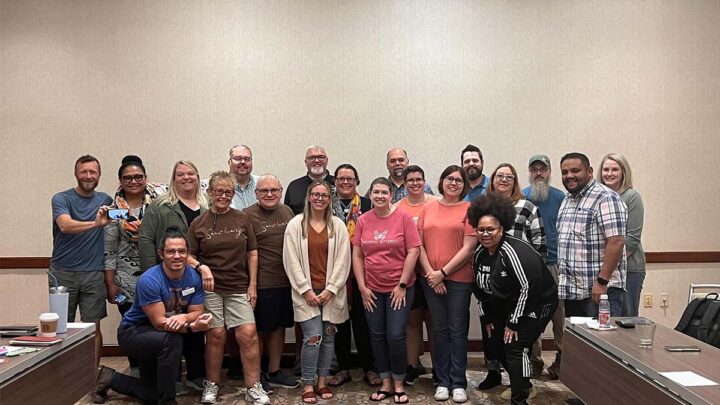On September 26-28, the Rev. Jason Villegas, our Conference Director of Youth Ministry, went to a gathering of other youth ministry leaders from other United Methodist Annual Conferences. He reflects on the gathering in this series of posts. Read part 1 here.
My own contribution to the conversion with other Conference youth ministry directors centered on creatively and craftily looking toward the future. But also, as I thought about the future, I thought of the past…“The thing that causes me the most pain is also what brings me the most hope,” I thought.
Consider this: our Church has been responsible for so much good, so much grace – helping people to know the prevenient, justifying, and sanctifying gift of God in Jesus Christ. And also, as the so-called American frontier was being settled a mere couple hundred years ago, with Native Americans being murdered and resettled, Methodists, along with many other Christians, co-signed on the US government’s actions. Methodist pastors sometimes gave theological justification to the practice of enslavement. And so I also thought, “Maybe as part of the Church dies, the Doctrine of Discovery and the demon of white supremacy can also die.”
And so, as we talked about the life of the Church, we thought of the type of church that might be honest about Christian history. We dreamt of a Church that might be open to an uncertain Christian future in which the Holy Spirit refuses to be entertained inside sanctuaries where the light is filtered through stained glass spectrums. We thought of a church in which Spirit dances through natural rainbows of her own making, painted untamed on the ground.
My pulse quickened in hope and fear as I thought about this, as I thought about my three children being members of a generation where more than 95% of them will probably not be in Church. This sets me up to think about one of the most significant challenges and opportunities ahead of us.
Institutions, including churches, are kind of like living things. They don’t want to die, and they’ll do whatever they can to survive. When humans become institutionalized, we will also do what we can for our institutions to survive, including holding onto resources. And this is one of the challenges of being a Christian: we are called to be giving, but when we enter a world of scarcity–where we don’t have what we used to–we are tempted to hoard our stockpiles of stuff.
As we talked about wanting to use resources to empower youth, I thought about how at the root of so much of the institutional church’s sin (or hamartia in Greek, for “missing the mark”) is the theological justification for us to have our resources and for others not to have them. This goes back to the Doctrine of Discovery (us having the land and not the Native Americans), enslavement (“us” being in charge of these bodies), and even the schisms (us having these buildings and resources).
As we move into the future, so many more possibilities open up if we move past the mentality to hoard. If we are open-handed, we may lose some of our material things, but we may gain connection with others. We could connect with other Christians in this world of disconnection and growing secularity. But also, if we better embrace our younger members than our tightly held Methods, we might hear ideas of how we could partner cross-sector, whether with youth activists or other organizations that influence their lives.
The third and final part of Jason’s reflection will be posted next week.

